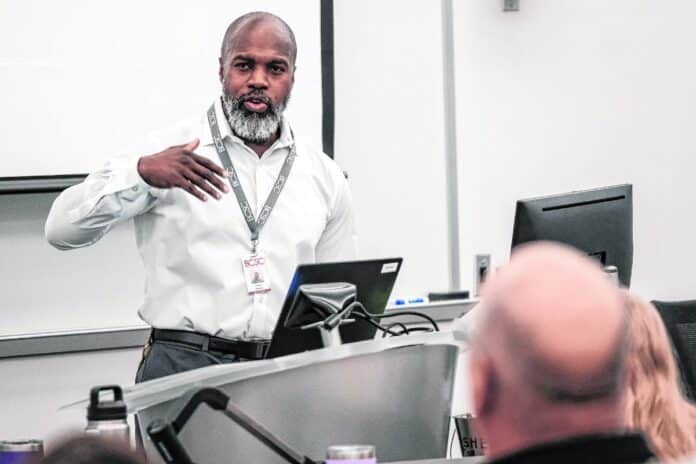
For a few hours Friday, more than 60 teachers, administrators and social service workers took time to take a critical look inside themselves.
During a round-table discussion led by Columbus East High School assistant principal Charles Edwards, attendees learned everyone has “implicit bias,” which Edwards said is less about racism, and more of a mental shortcut toward evaluating others based on stereotypes.
“It comes from sorting things into categories, creating associations, and then filling in gaps,” Edwards said.
Examples of implicit bias mentioned during the discussion include that all Asians are good at math, tall men are better leaders, retirees are computer illiterate, and woman are at a distinct advantage when getting their cars fixed.
“We have to get beyond our preconceived notions of who people are, based simply on how they look,” Edwards said.
The biggest problem created by implicit bias is that it gives some people an unfair advantage, while others find themselves at a disadvantage through no fault of their own, Edwards said.
Although this thought process is often done subconsciously, an implicit bias still impacts attitudes that causes individuals to look at people and treat them differently, Edwards said.
In quoting psychologist William S. Gilliam, Edwards said “implicit bias is like the wind. You can’t see it, but you can sure see its effects.”
For those wanting to change this thought process, Edwards offered the following advice: After acknowledging your own implicit bias, you can begin practices that interrupts that type of thinking.
Practices might include listening to the voices of others who have experienced bias, using inclusive language, and getting to know people different than yourself, so you will have imagery that counters stereotyping, Edwards said.
Near the conclusion of his presentation, Edwards encouraged teachers, administrators and social service workers to follow four principles — thinking, inquiring, doing and empowering.
Thinking involves reflecting on whether each of your interactions with others were respectful. Edwards said it also means considering comments from others that don’t necessarily reflect your beliefs or values.
Inquiring means asking respectful questions to avoid making assumptions, he said. This also involves listening to gain information, insight and understanding, Edwards said.
The third principle requires you to do something to acknowledge your bias and shift your perceptions. For example, he suggested refraining from laughter or silence in order to reduce the impact of bias jokes or comments.
And once you achieve those three principles, you can begin to empower others by example. The presenter said that might include modeling and motivating courageous self-appraisal in others, as well as providing opportunities for conversation and education.
“And thank those who have the courage to think, inquire and do,” Edwards said in his concluding remarks.
Since 2005, Edwards has co-chaired the diversity council of the Bartholomew Consolidated School Corp. In the past, the council has tackled difficult topics related to diversity such as privilege, the burden of representation and disproportionality.




